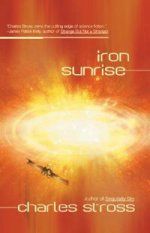
Iron Sunrise
Charles Stross
355 pages
published in 2004
Since I quite liked Charlie's first novel, Singularity Sky, I snapped this, the sequel, up when I saw it in the local science fiction bookstore. Managed to finish it in less then a day. Iron Sunrise is a step up from Singularity Sky, less farcial, though also less focused. It isn't a direct sequel, but it does star two of the earlier book's main characters.
The title refers to the event that drives the plot: the deliberate supernovaing of Moscow Prime, the star around which Moscow, a boring, inoffensive little Mcworld revolves. Why somebody would want to destroy this world is unclear. The most plausible suspect was the then government of their neighbour New Dresden, at the time involved in a trade dispute with them. At any rate, it was at New Dresden that Moscow's almost unstoppable STL second strike planetbusters were aimed and are now underway to. The only way to stop these, is to convince enough of Moscow's surviving ambassadors to call off the attack --and somebody is killing them...
Enter Rachel Mansour and Martin Springfield, last seen in Singularity Sky. Rachel is sent out to New Dresden and elsewhere to both try and protect the remaining ambassadors as well as convince them of issuing the recall code. She is happy to do so, as she was stuck in an inquiry some officious busybody has subjected her to, after the events of the previous novel. Not to mention that she had to stop a loon with an atom bomb from blowing up Genevea.
Who exactly is behind the attack on Moscow is still a mystery, but there is one person who holds the key to it Unfortunately she is Wednesday Springmist, one of the refugees from the last remaining sovereign territory of Moscow, spacestation Old Newfoundland Four, a somewhat asocial loner, who has been hearing a voice in her head from when she was a small child...
The backstory here is of course the same as in Singularity Sky. In the 21st century, some sort of AI bootstrapped itself from Earth's computer networks, became all-powerful and scattered a large part of Earth's population all over the universe -scattered them in time as well as space. Fast forward three centuries and you have a rebuilt Earth, as well as hundreds if not thousands of "colony" systems, at various stages of technological and political development...
Meanwhile this AI god, or the Eschaton as it calls itself, is still keeping an eye on events and has its agents active in the local lightcone, to make sure nobody does anything too naughty, like creating technology that could threaten it. In Singularity Sky, Martin Springfield was one of these agents, getting assignments from one Herman. In Iron Sunrise, Wednesday hears a voice in her head calling itself Herman --guess who the Eschaton agent is this time?
The story is told largely from Rachel's or Wednesday's point of view, but jumps around to other players as well, including the villains of the story. This made the storyline a bit looser then it could've been; whether this is a flaw or not depends on your own preferences. For me, getting into the heads of the villains took away some of their menace, as up close they were somewhat less impressive then seen from afar.
They're still nasty buggers though, as the experiences of one of the supporting characters, the London Times warblogger (!) Frank show. The best way to describe them is to think of them as a more realistic version of S. M. Stirling's Draka, without the author on their side. Whoolly dedicated to creating the superhuman, yet not so superhuman when we get to see them up close...
Comparing this to Singularity Sky, I see a marked improvement. The writing is better, the humour is less selfconciously funny, more restrained, the plot's more interesting and the outcome less in doubt. Marked improvemnt too in the characterisation, which was a bit of a weak point in the previous book, but here all major characters are recognisably different and three-dimensional.
What I didn't like was the way the plot sometimes jumped around; it didn't seem to fit the story. Apart from that, there were a few minor nitpicks: use of the word "Warblogger" frex, which was a bit too cutesy. Another annoyance were the too frequents recaps of what exactly the Eschaton was, later in the book. Don't let these stop you from reading a damn fine space opera though.
